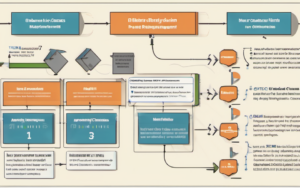The rapid rise of blockchain startups has sparked intense debate: are these innovative ventures a fleeting fad, or are they poised to revolutionize industries and reshape the global economy? Understanding the technology’s potential and the challenges facing these businesses is crucial to predicting their long-term viability. This exploration into the world of blockchain startups will help you form your own informed opinion on their future.
1. Introduction: The Blockchain Revolution
The advent of blockchain technology has undeniably disrupted various sectors. Its decentralized and secure nature offers transformative potential across industries. From finance and supply chain management to healthcare and voting systems, the applications seem limitless. However, the question remains: will the initial hype surrounding blockchain startups translate into sustainable, long-term growth? The answer lies in understanding both the technology’s strengths and the hurdles it faces. The sheer volume of investment pouring into the space—a testament to the perceived potential—suggests that many believe blockchain startups are here to stay, impacting the economy in profound ways. We will delve into these aspects to answer the question of blockchain startup longevity.
2. Understanding Blockchain Technology
2.1. Core Principles of Blockchain
At its heart, blockchain is a distributed, immutable ledger. Transactions are recorded in “blocks” which are then chained together cryptographically, creating a secure and transparent system. This eliminates the need for a central authority, fostering trust and efficiency. The decentralized nature makes it resistant to single points of failure, a significant advantage over traditional systems. This core principle underpins the potential of blockchain for various applications, from secure data storage to transparent supply chains, which addresses concerns about the long-term viability of blockchain businesses.
This inherent security and transparency are key to addressing the concerns about the future of blockchain startups. The ability to track assets and transactions with unparalleled accuracy opens up new possibilities for numerous sectors.
2.2. Beyond Cryptocurrencies: Real-World Applications
While cryptocurrencies like Bitcoin brought blockchain to the forefront, its applications extend far beyond digital currencies. Supply chain management benefits from enhanced transparency and traceability, reducing fraud and improving efficiency. Healthcare can leverage blockchain for secure data storage and patient record management, improving data privacy and interoperability. Even voting systems can be revolutionized, offering increased security and trust. The diverse range of applications demonstrates the potential for widespread adoption, supporting the argument that blockchain startups are not just a passing trend but could have a significant impact on the economy.
These diverse applications highlight the potential for disruption across industries, contributing to the long-term viability of blockchain businesses. The more diverse the application, the more resilient the technology and the associated startups become.
2.3. Types of Blockchain Networks
Different blockchain networks cater to various needs. Public blockchains, like Bitcoin, are open and permissionless, while private blockchains offer greater control and privacy. Consortium blockchains, a hybrid approach, involve multiple organizations sharing control. Understanding these variations is crucial for assessing the suitability of blockchain for specific applications and the challenges faced by blockchain startups operating within these different ecosystems. The choice of network significantly affects scalability and regulatory considerations.
3. The Rise of Blockchain Startups
3.1. Funding and Investment in Blockchain
The substantial funding pouring into blockchain startups signifies significant investor confidence. Venture capital firms, angel investors, and even established corporations are actively investing in this burgeoning sector. This influx of capital fuels innovation, allowing startups to develop and scale their solutions. The continued investment suggests a belief in the long-term viability of blockchain businesses and their potential for substantial returns. Analyzing investment trends offers insights into the future of blockchain startups.
The sustained high levels of investment in blockchain startups are a strong indicator that the technology is seen as more than just a passing fad. This ongoing financial support is a key factor contributing to their sustainability.
3.2. Key Players and Industry Leaders
Several blockchain startups have emerged as industry leaders, demonstrating the sector’s maturity and potential. These companies are developing innovative solutions and setting industry standards, driving adoption and shaping the future of the technology. The presence of these established players indicates a level of stability and longevity within the blockchain startup ecosystem. Studying their strategies and successes can provide valuable insights into the long-term viability of blockchain businesses.
The existence of established players signifies maturity within the industry, strengthening the case for the sustainable growth of blockchain startups.
3.3. Geographic Distribution of Blockchain Startups
Blockchain startups are not confined to a single region; they’re globally distributed. This global presence showcases the technology’s universal appeal and potential for widespread adoption. The geographic diversity also contributes to the resilience of the ecosystem, mitigating risks associated with regional economic downturns or regulatory changes. This international presence contributes to the long-term viability of blockchain businesses.
4. Challenges Facing Blockchain Startups
4.1. Regulatory Uncertainty and Compliance
Regulatory uncertainty remains a significant challenge. The decentralized nature of blockchain clashes with traditional regulatory frameworks, leading to ambiguity and complexity for startups. Navigating this regulatory landscape is crucial for long-term sustainability. This regulatory uncertainty affects the long-term viability of blockchain businesses and requires careful navigation.
This uncertainty affects the future of blockchain startups as it can hinder growth and investment. Clearer regulatory frameworks are needed to unlock the full potential of the technology.
4.2. Scalability and Interoperability Issues
Scaling blockchain networks to handle large transaction volumes remains a significant hurdle. Interoperability—the ability for different blockchain networks to communicate—is also crucial for widespread adoption. Addressing these issues is essential for the long-term viability of blockchain businesses. These issues are among the key challenges facing blockchain startups and impact their ability to scale efficiently.
Overcoming these challenges is key to the widespread adoption and long-term success of blockchain startups.
4.3. Security Concerns and Vulnerabilities
While blockchain is inherently secure, vulnerabilities can still exist, especially in poorly designed smart contracts or applications. Addressing security concerns is paramount to building trust and ensuring the long-term viability of blockchain businesses. Security is a critical aspect of the long-term viability of blockchain businesses, requiring constant vigilance and innovation.
Robust security protocols and practices are crucial to maintaining user trust and ensuring the continued growth of the blockchain ecosystem.
4.4. Talent Acquisition and Skill Gaps
Finding skilled developers and professionals with expertise in blockchain technology is a challenge for many startups. The demand for talent far outweighs the supply, impacting growth and innovation. Addressing this skill gap is essential for the continued success of blockchain startups and impacts the future of blockchain startups.
Addressing this talent shortage is crucial to ensure the continued growth and innovation within the blockchain industry.
5. The Future of Blockchain Startups
5.1. Emerging Trends and Innovations
Several emerging trends shape the future of blockchain startups. The integration of artificial intelligence (AI) and machine learning (ML) with blockchain promises to enhance efficiency and decision-making. The development of more sustainable and energy-efficient blockchain networks is also crucial. These innovations will likely play a significant role in the long-term viability of blockchain businesses.
These emerging trends indicate a dynamic and evolving landscape, suggesting continued innovation and growth within the blockchain sector.
5.2. Potential for Disruption Across Industries
Blockchain’s potential to disrupt various industries is immense. From supply chain management and finance to healthcare and digital identity, the transformative impact is undeniable. This potential for disruption fuels the growth and investment in blockchain startups and underpins the belief in their long-term viability. The potential for disruption across multiple industries contributes significantly to the impact of blockchain startups on the economy.
The potential for transformative change across diverse sectors supports the assertion that blockchain startups are not merely a passing trend.
5.3. Long-Term Viability and Sustainability
The long-term viability of blockchain startups depends on several factors: overcoming technological challenges, navigating regulatory hurdles, attracting and retaining talent, and demonstrating clear value propositions. While challenges remain, the continued investment, diverse applications, and ongoing innovation suggest a promising future for many blockchain startups. The long-term viability of blockchain businesses depends heavily on these factors.
The question of blockchain startup longevity hinges on the successful navigation of these challenges and the continued demonstration of the technology’s value. While some ventures may fail, the underlying technology’s potential suggests that the overall sector is far from a fad. The continued exploration and development of blockchain technology are crucial to unlocking its full potential and ensuring the sustainable growth of the ecosystem. The overall impact of blockchain startups on the economy will be significant, shaping the future of various industries.




